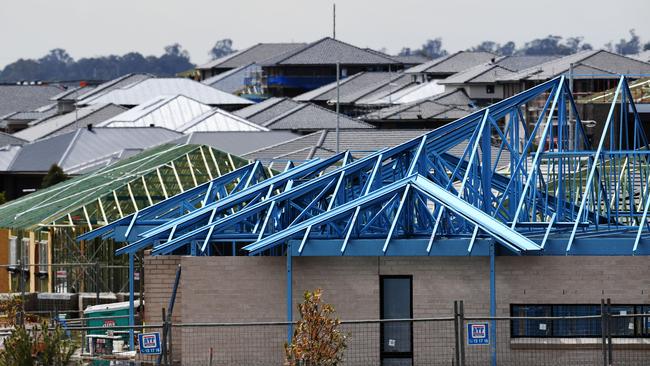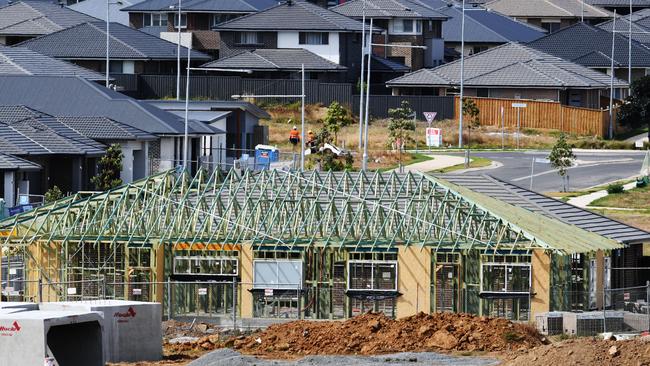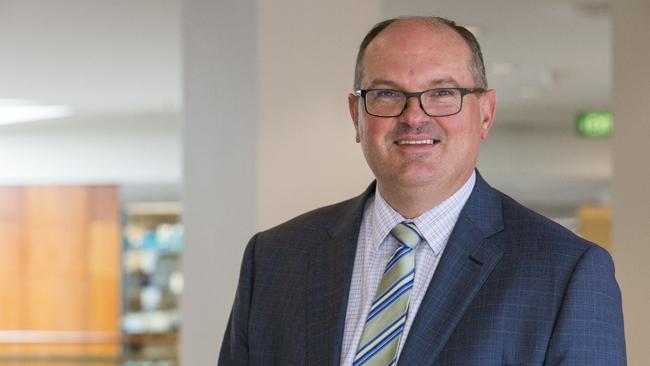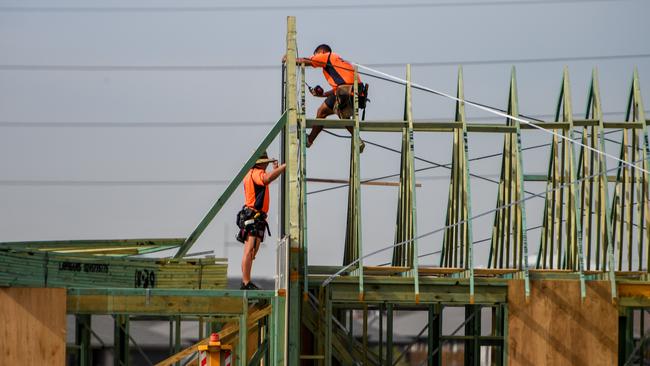New housing charges build up to $110K hit for NSW residents
New charges and energy standards could add up to $110,000 in costs to each new home built on Sydney’s outskirts, hobbling supply which is desperately needed to bring down the cost of housing.

NSW
Don't miss out on the headlines from NSW. Followed categories will be added to My News.
New charges and energy standards could add up to $110,000 in costs to each new home built on Sydney’s outskirts, hobbling supply which is desperately needed to bring down the cost of housing.
Analysis by the Urban Development Institute of Australia (UDIA) highlights three new charges set to hit home builders within the coming year, which would lump more than $100,000 on a new home being built in key growth areas on the edges of Sydney.
According to the UDIA, the introduction of Sydney Water and Hunter Water Development Servicing Plan (DSP) developer charges could hit a home builder in the Greater Macarthur region with up to $46,000 extra in fees to hook up drinking and wastewater services.
Developers could also pay up to $30,000 extra to ensure new homes comply with building codes dictating that homes are energy efficient, in changes set to come in October.
Other homes could be hit with up to $37,000 in biodiversity and transport charges, in changes to the Housing and Productivity Contribution scheme also set to be phased in from October.

UDIA NSW CEO Steve Mann said that now the worst time to add up to $110,000 in extra charges as Sydney faces a housing crisis.
“The NSW Government has the chance ensure the delivery of critical new housing isn’t undermined by scrapping these poorly timed new charges which will add to the cost of a new home and put the great Australian dream further out of reach of home buyers,” he said.
“We’re in the middle of a housing supply crisis and now is the worst possible time to add up to $110,000 in government charges and cost on a new home in the coming few years.
“This will make the housing supply crisis worse and put projects at risk by pushing up prices in a market where borrowers are already being priced out with record high interest rates.”
It comes as NSW faces having to build up to 76,000 new homes a year to reach lofty housing targets set by the federal government, compared to 47,000 achieved in the last 12 months.
Further analysis by the UDIA suggests NSW developers pay a greater percentage of taxes, levis and contributions per a single unit compared to other states – with 11.4 per cent of a NSW build slugged by the costs, compared to 6.4 per cent for Victoria and 4.4 per cent in Queensland.
UDIA’s analysis of the NSW Government’s Housing and Productivity Contribution scheme outlines how a new home in Greater Sydney could be hit with up to $12,000 to build a new house, as well as an additional $10,000 for biodiversity certified land, and a potential $15,000 charge for building near public transport, as has already been outlined in the scheme for Pyrmont.

It’s understood the NSW Government has no current plans to add the additional $15,000 charge to other areas.
The UDIA’s analysis also suggests complying with new energy efficient codes could cost up to $30,000 per home, but chief executive officer of Australian Building Codes Board, Gary Rake, suggested the figure could be lower.
He said the codes’ analysis had suggested extensive work on large homes – such as double-glazing windows – could see prices rise to $30,000, but other measures to heat-proof homes – such as lighter-coloured roofs, would be much cheaper.
“As we see warmer summers, one of the best things we can do for long-term affordability is to reduce the amount of electricity used in homes – warm in winter and cool in summer,” he said.

Minister for Planning and Public Spaces Paul Scully said houses built to the new energy standards “will recoup these construction costs in energy bill savings over the lifetime of the home – something like an additional $1000 per year for new homeowners in Western Sydney”.
“The Government’s policy is clear and is aligned with the recent report from the NSW Productivity Commissioner, to rebalance housing growth across Sydney with more focus on well-located homes close to transport and existing infrastructure, and nearer to the CBD,” he said.
Water Minister Rose Jackson said any new charges on water infrastructure was to ensure new homes come “hand-in-hand with new or expanded infrastructure to ensure our communities are functional and enjoyable places to live”.
NSW Productivity Commissioner Peter Peter Achterstraat told Sky News on Tuesday all levels of government had to pull in the same direction.
“We all have to work together – we have to listen to the council (and) community. AT the end of the day we have to make decision not for just today’s population …(but) new people coming,” he said.





